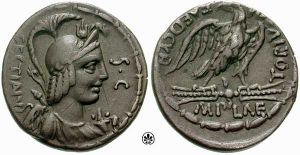
Vacuna
Encyclopedia

Sabine
The Sabines were an Italic tribe that lived in the central Appennines of ancient Italy, also inhabiting Latium north of the Anio before the founding of Rome...
goddess, identified by ancient Roman sources and later scholars with numerous other goddesses, including Ceres, Diana, Nike
Nike (mythology)
In Greek mythology, Nike was a goddess who personified victory, also known as the Winged Goddess of Victory. The Roman equivalent was Victoria. Depending upon the time of various myths, she was described as the daughter of Pallas and Styx and the sister of Kratos , Bia , and Zelus...
, Minerva
Minerva
Minerva was the Roman goddess whom Romans from the 2nd century BC onwards equated with the Greek goddess Athena. She was the virgin goddess of poetry, medicine, wisdom, commerce, weaving, crafts, magic...
, Bellona
Bellona (goddess)
Bellona was an Ancient Roman goddess of war, similar to the Ancient Greek Enyo. Bellona's attribute is a sword and she is depicted wearing a helmet and armed with a spear and a torch....
, Venus
Venus (mythology)
Venus is a Roman goddess principally associated with love, beauty, sex,sexual seduction and fertility, who played a key role in many Roman religious festivals and myths...
and Victoria
Victoria (mythology)
In ancient Roman religion, Victoria was the personified goddess of victory. She is the Roman equivalent of the Greek goddess Nike, and was associated with Bellona. She was adapted from the Sabine agricultural goddess Vacuna and had a temple on the Palatine Hill...
. She was mainly worshipped at a sanctuary in near Horace's villa
Horace's Villa
Horace's Villa is a Roman archaeological complex near Licenza, Italy. The identification has been made possible because Horace wrote several poems about the place, and the location of the villa corresponds to the geographical indications in the poetry....
(now in the commune of Licenza), in sacred woods at Reate, and at Rome.
The protection she was asked to provide remains obscure. Pomponius Porphyrion
Pomponius Porphyrion
Pomponius Porphyrion was a Latin grammarian and commentator on Horace, possibly a native of Africa, who flourished during the 2nd or 3rd century....
calls her incerta specie (of an uncertain kind) in his commentaries on Horace
Horace
Quintus Horatius Flaccus , known in the English-speaking world as Horace, was the leading Roman lyric poet during the time of Augustus.-Life:...
. Renaissance authors and Leonhard Schmitz
Leonhard Schmitz
Leonhard Schmitz was a German-born classical scholar and educator active mainly in the United Kingdom.Schmitz was born in Eupen and attended gymnasium in Aachen. He lost his right arm in an accident at the age of 10, but nonetheless excelled academically...
state that she was a divinity to whom the country people offered sacrifices when the labours of the field were over, that is, when they were at leisure, vacui.
The etymology of her name is linked to lack and privation
Privation
In psychology and philosophy, privation is the absence or lack of basic necessities. The term can be used in a psychological context, often referring to a lack of relationships, or a philosophical context, where vital concepts are absent....
, and Horace appears to call upon her in favour of a friend to whom one of his epistles is addressed. From this, it has been conjectured that she was prayed to in favour of absent people, family members or friends.
Period sources
Literary sources:- HoraceHoraceQuintus Horatius Flaccus , known in the English-speaking world as Horace, was the leading Roman lyric poet during the time of Augustus.-Life:...
, Epistles, l. 1, ep. 10, v. 49-50 (commented by Pomponius PorphyrionPomponius PorphyrionPomponius Porphyrion was a Latin grammarian and commentator on Horace, possibly a native of Africa, who flourished during the 2nd or 3rd century....
, Helenius AcronHelenius AcronHelenius Acron was a Roman commentator and grammarian, probably of the 5th century, but whose precise date is not known.He is known to have written on Terence and Horace. These commentaries on Horace are now lost but are referred to by the grammarian Charisius...
and the scholiast of Cruquius); - OvidOvidPublius Ovidius Naso , known as Ovid in the English-speaking world, was a Roman poet who is best known as the author of the three major collections of erotic poetry: Heroides, Amores, and Ars Amatoria...
, Fasti, 6, v. 305 to 308; - Pliny the ElderPliny the ElderGaius Plinius Secundus , better known as Pliny the Elder, was a Roman author, naturalist, and natural philosopher, as well as naval and army commander of the early Roman Empire, and personal friend of the emperor Vespasian...
, Natural History, l. 3 (ch. 12), par. 109; - AusonAusoniusDecimius Magnus Ausonius was a Latin poet and rhetorician, born at Burdigala .-Biography:Decimius Magnus Ausonius was born in Bordeaux in ca. 310. His father was a noted physician of Greek ancestry and his mother was descended on both sides from long-established aristocratic Gallo-Roman families...
, Epistle 4, v. 101.
Epigraphical sources:
- Corpus Inscriptionum LatinarumCorpus Inscriptionum LatinarumThe Corpus Inscriptionum Latinarum is a comprehensive collection of ancient Latin inscriptions. It forms an authoritative source for documenting the surviving epigraphy of classical antiquity. Public and personal inscriptions throw light on all aspects of Roman life and history...
, IX, 4636, 4751, 4752.

